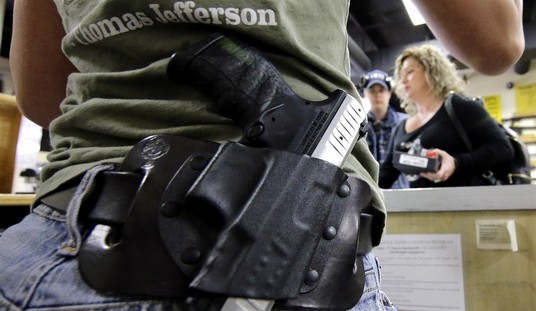Do you feel like you’re paying more and getting less when you go to the store or order something online these days? “Shrinkflation” is bad enough when it comes to private commerce, but its utterly unconscionable when it comes to the exercise of a fundamental right. Yet that’s exactly what a new bill in Maryland would do when it comes to the right to carry; jacking up the fees associated with applying for a license while decreasing the length of time that the Concealed Handgun License is valid.
The doubling of the application fee from $75 to $150 while requiring renewal every two years (as opposed to the current three-year limit) are just a couple of the reasons why groups like Maryland Shall Issue are so opposed to HB 824, which is set to be heard in the House Judiciary Committee in Annapolis on Wednesday afternoon. The organization says the bill is fundamentally flawed on multiple levels, including barring some individuals convicted of non-violent misdemeanors from lawfully owning firearms.
The Bruen Court ruled that “the standard for applying the Second Amendment is as follows: When the Second Amendment’s plain text covers an individual’s conduct, the Constitution presumptively protects that conduct. The government must then justify its regulation by demonstrating that it is consistent with the Nation’s historical tradition of firearm regulation.” 142 S.Ct. at 2127. The relevant time period for that historical analogue is 1791, when the Bill of Rights was adopted. 142 S.Ct. at 2135. That is because “‘Constitutional rights are enshrined with the scope they were understood to have when the people adopted them.’” Id., quoting District of Columbia v. Heller, 554 U.S. 570, 634–635 (2008). Under that standard articulated in Bruen, “the government may not simply posit that the regulation promotes an important interest.” 142 S.Ct. at 2126. Bruen expressly abrogates the two-step, “means-end,” “interest balancing” test that the courts had previously used to sustain gun bans. Id. Those prior decisions applying interest balancing and a “means-end” test are no longer good law.
Under this standard adopted in Bruen, it is highly questionable whether the State may impose a firearms disqualification for a misdemeanor violation not involving a violent crime. For example, the Court of Appeals for the Fifth Circuit just applied Bruen to invalidate 18 U.S.C. § 922(g)(8), which imposes a firearms disqualification of person subject to a domestic violence restraining order. See United States v. Rahimi, — F.4th —-, 2023 WL 1459240 (5th Cir. Feb. 2, 2023). Similarly, the court in United States v. Quiroz, — F.Supp.3d —-, 2022 WL 4352482 (W.D. Tex. 2022), invalidated 18 U.S.C. 922(n) (imposing a disqualification for persons under indictment). And in United States v. Harrison, — F.Supp.3d —, 2023 WL 1771138 (W.D. Okla. 2023), the court invalidated 18 U.S.C. 922(g)(3), which imposes a disqualification on users of substances made unlawful by the federal Controlled Substances Act, including cannabis. See also United States v. Price, — F.Supp.3d —, 2022 WL 6968457 (S.D. W.Va. 2022) (invalidating 18 U.S.C. § 922(k), holding that criminalizing the knowing possession of a firearm with an obliterated serial number was unconstitutional under Bruen).
HB 824 also blocks law-abiding adults under the age of 21 from obtaining a handgun, while MSI points to several recent federal court decisions invalidating various gun bans for under-21s. And when it comes to making it more expensive to exercise your right to bear arms in self-defense, the 2A group says the state is treading on thin ice.
It is well-established that State’s power to impose fees on the exercise of a constitutional right is very limited. See Cox v. New Hampshire, 312 U.S. 569 (1941). In Murdock v. Pennsylvania, 319 U.S. 105 (1943), the Court invalidated a city ordinance which as construed and applied, required distributors of religious literature to pay a flat license fee as a prerequisite to conducting their activities, holding that a “State may not impose a charge for the enjoyment of a right granted by the Federal Constitution.” 319 U.S. at 113. Under these rulings, a fee imposed on the exercise of a constitutional right must not be a general “revenue tax,” but such a fee is lawful if it is instead designed “to meet the expense incident to the administration of the act and to the maintenance of public order in the matter licensed.” Cox., 312 U.S. at 577. See also S. Oregon Barter Fair v. Jackson Cty., 372 F.3d 1128, 1139 (9th Cir. 2004) (holding that a “state may … impose a permit fee that is reasonably related to legitimate content-neutral considerations, such as the cost of administering the ordinance” in question, as long as the ordinance or other underlying law is itself constitutional).
To justify the fees imposed by this bill, the State would be required, at a minimum, to satisfy this test. The burden would be on the State to show that the fees are limited to the “cost of administering” otherwise reasonable and appropriate provisions of the permit process. Id. See also Ne. Ohio Coal. for the Homeless v. City of Cleveland, 105 F.3d 1107, 1109–10 (6th Cir. 1997) (“The lesson to be gleaned from Cox and Murdock is that an ordinance requiring a person to pay a license or permit fee before he can engage in a constitutionally protected activity does not violate the Constitution so long as the purpose of charging the fee is limited to defraying expenses incurred in furtherance of a legitimate state interest.”). The doubling of fees has not been justified by any such analysis. Without such proof, the doubling of fees will not survive judicial review.
Indeed, it is an open question whether this Cox and Murdock analysis, developed in First Amendment litigation, is even applicable to Second Amendment challenges under the text, history and tradition test articulated in Bruen. That test applies to all statutes that regulate activity protected by the text of the Second Amendment and we know of no historical analogue that would permit the imposition of fees. For example, a “tiers of scrutiny” approach applies to First Amendment cases, but the Court expressly rejected that approach under the Second Amendment. Thus, there is no deference to legislative judgments under the Second Amendment. See Bruen, 142 S.Ct. at 2131 (“But while that judicial deference to legislative interest balancing is understandable—and, elsewhere, appropriate—it is not deference that the Constitution demands here.”). The State would be wise to reduce the cost of the permitting process, not add to it. The State may well be stuck with the tab for all these costs.
We can only hope. After all, it’s not like HB 824 is the only anti-carry bill under consideration in Annapolis. Democrats are also taking aim at where those who possess a concealed handgun license can carry by proposing turning most publicly-accessible places into “gun-free zones”; another flagrant attempt to defy the Supreme Court and infringe on the fundamental rights of Marylanders.
Taken together, it’s clear that the intent of lawmakers is to continue to make the right to bear arms off-limits to the vast majority of residents, first by making it harder and more expensive to obtain a permit, and then making it a criminal offense to actually carry a firearm in most settings. And while groups like Maryland Shall Issue will be making their opposition known at the statehouse this afternoon, chances are they’re going to end up having to challenge these infringements in court before all is said and done.









Join the conversation as a VIP Member